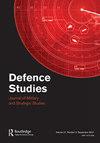Transatlantic cooperation in flux: Europe’s small and cautious steps towards “strategic autonomy”
Q1 Arts and Humanities
引用次数: 2
Abstract
ABSTRACT The existing, liberal world order is under pressure and transatlantic cooperation on security is challenged. The paper raises the question, why have the European steps and policy initiatives towards addressing the new international threats and challenges to Europe been so limited and cautious. The first argument states it is because the European decision-makers were unable to agree when it came to implementing salient and concrete policies addressing new security threats and building strategic autonomy. The second argument states that the European decision-makers were only able to reach agreement on diffuse and symbolic policy ideas like building “strategic autonomy” for the European Union. The third argument states that the Europeans were able to address some of the new security challenges if it took place within NATO. The analysis shows that the European responses and reactions to the increasing tensions in the Indo-Pacific were subdued. The Europeans were unable to launch any concrete reactions to the American unilateral abrogation of the Iranian nuclear deal, to the unilateral American policy initiatives in the Israel-Palestine conflict or to the US withdrawal from Afghanistan. However, the Europeans increased the level of their defense spending and they also cooperated closely with their transatlantic partner to counter the assertive Russian foreign policy behavior.不断变化的跨大西洋合作:欧洲走向“战略自治”的谨慎小步
摘要现有的自由世界秩序面临压力,跨大西洋安全合作面临挑战。该文件提出了一个问题,为什么欧洲应对欧洲面临的新的国际威胁和挑战的步骤和政策举措如此有限和谨慎。第一种观点认为,这是因为欧洲决策者在实施应对新安全威胁的突出而具体的政策和建立战略自主性方面无法达成一致。第二种观点认为,欧洲决策者只能就分散和象征性的政策理念达成一致,比如为欧盟建立“战略自主”。第三种观点认为,如果在北约内部进行,欧洲人能够应对一些新的安全挑战。分析表明,欧洲对印太紧张局势加剧的反应和反应有所缓和。欧洲人无法对美国单方面废除伊朗核协议、美国在以巴冲突中的单方面政策举措或美国从阿富汗撤军做出任何具体反应。然而,欧洲人增加了国防开支,他们还与跨大西洋伙伴密切合作,以对抗俄罗斯强硬的外交政策行为。
本文章由计算机程序翻译,如有差异,请以英文原文为准。
求助全文
约1分钟内获得全文
求助全文

 求助内容:
求助内容: 应助结果提醒方式:
应助结果提醒方式:


